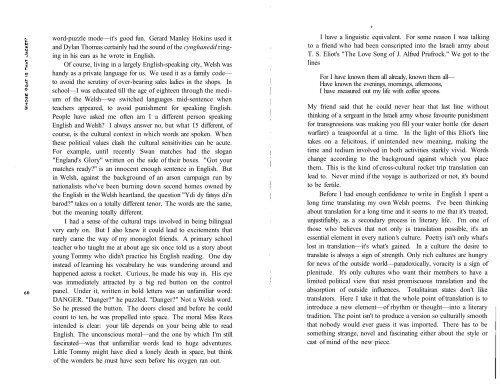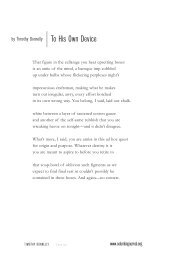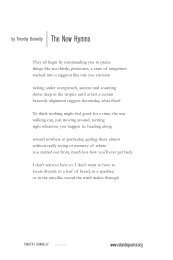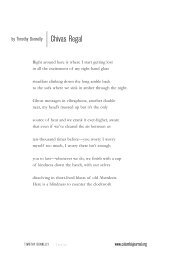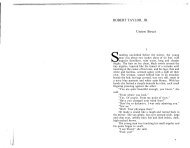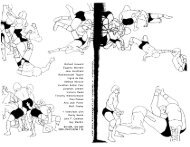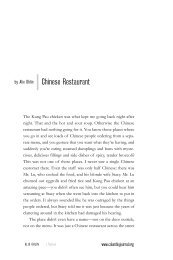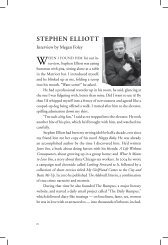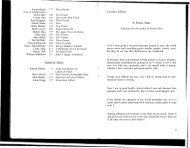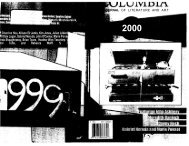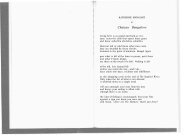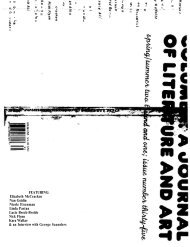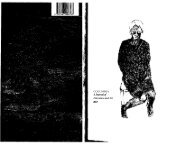Issue 27 - Columbia: A Journal of Literature and Art
Issue 27 - Columbia: A Journal of Literature and Art
Issue 27 - Columbia: A Journal of Literature and Art
You also want an ePaper? Increase the reach of your titles
YUMPU automatically turns print PDFs into web optimized ePapers that Google loves.
o<br />
60<br />
word-puzzle mode—it's good fun. Gerard Manley Hokins used it<br />
<strong>and</strong> Dylan Thomas certainly had the sound <strong>of</strong> the cynghanedd ringing<br />
in his ears as he wrote in English.<br />
Of course, living in a largely English-speaking city, Welsh was<br />
h<strong>and</strong>y as a private language for us. We used it as a family code—<br />
to avoid the scrutiny <strong>of</strong> over-bearing sales ladies in the shops. In<br />
school—I was educated till the age <strong>of</strong> eighteen through the medium<br />
<strong>of</strong> the Welsh—we switched languages mid-sentence when<br />
teachers appeared, to avoid punishment for speaking English.<br />
People have asked me <strong>of</strong>ten am I a different person speaking<br />
English <strong>and</strong> Welsh? I always answer no, but what 15 different, <strong>of</strong><br />
course, is the cultural context in which words are spoken. When<br />
these political values clash the cultural sensitivities can be acute.<br />
For example, until recently Swan matches had the slogan<br />
"Engl<strong>and</strong>'s Glory" written on the side <strong>of</strong> their boxes. "Got your<br />
matches ready?" is an innocent enough sentence in English. But<br />
in Welsh, against the background <strong>of</strong> an arson campaign run by<br />
nationalists who've been burning down second homes owned by<br />
the English in the Welsh heartl<strong>and</strong>, the question "Ydi dy fatsys di'n<br />
barod?" takes on a totally different tenor. The words are the same,<br />
but the meaning totally different.<br />
I had a sense <strong>of</strong> the cultural traps involved in being bilingual<br />
very early on. But I also knew it could lead to excitements that<br />
rarely came the way <strong>of</strong> my monoglot friends. A primary school<br />
teacher who taught me at about age six once told us a story about<br />
young Tommy who didn't practice his English reading. One day<br />
instead <strong>of</strong> learning his vocabulary he was w<strong>and</strong>ering around <strong>and</strong><br />
happened across a rocket. Curious, he made his way in. His eye<br />
was immediately attracted by a big red button on the control<br />
panel. Under it, written in bold letters was an unfamiliar word:<br />
DANGER. "Danger?" he puzzled. "Danger?" Not a Welsh word.<br />
So he pressed the button. The doors closed <strong>and</strong> before he could<br />
count to ten, he was propelled into space. The moral Miss Rees<br />
intended is clear: your life depends on your being able to read<br />
English. The unconscious moral—<strong>and</strong> the one by which I'm still<br />
fascinated—was that unfamiliar words lead to huge adventures.<br />
Little Tommy might have died a lonely death in space, but think<br />
<strong>of</strong> the wonders he must have seen before his oxygen ran out.<br />
I have a linguistic equivalent. For some reason I was talking<br />
to a friend who had been conscripted into the Israeli army about<br />
T. S. Eliot's "The Love Song <strong>of</strong> J. Alfred Prufrock." We got to the<br />
lines<br />
For I have known them all already, known them all—<br />
Have known the evenings, mornings, afternoons,<br />
I have measured out my life with c<strong>of</strong>fee spoons.<br />
My friend said that he could never hear that last line without<br />
thinking <strong>of</strong> a sergeant in the Israeli army whose favourite punishment<br />
for transgressions was making you fill your water bottle (for desert<br />
warfare) a teaspoonful at a time. In the light <strong>of</strong> this Eliot's line<br />
takes on a felicitous, if unintended new meaning, making the<br />
time <strong>and</strong> tedium involved in both activities starkly vivid. Words<br />
change according to the background against which you place<br />
them. This is the kind <strong>of</strong> cross-cultural rocket trip translation can<br />
lead to. Never mind if the voyage is authorized or not, it's bound<br />
to be fertile.<br />
Before I had enough confidence to write in English I spent a<br />
long time translating my own Welsh poems. I've been thinking<br />
about translation for a long time <strong>and</strong> it seems to me that it's treated,<br />
unjustifiably, as a secondary process in literary life. I'm one <strong>of</strong><br />
those who believes that not only is translation possible, it's an<br />
essential element in every nation s culture. Poetry isn't only what's<br />
lost in translation—it's what's gained. In a culture the desire to<br />
translate is always a sign <strong>of</strong> strength. Only rich cultures are hungry<br />
for news <strong>of</strong> the outside world—paradoxically, voracity is a sign <strong>of</strong><br />
plenitude. It's only cultures who want their members to have a<br />
limited political view that resist promiscuous translation <strong>and</strong> the<br />
absorption <strong>of</strong> outside influences. Totalitairan states don't like<br />
translators. Here I take it that the whole point <strong>of</strong> translation is to<br />
introduce a new element—<strong>of</strong> rhythm or thought—into a literary<br />
tradition. The point isn't to produce a version so culturally smooth<br />
that nobody would ever guess it was imported. There has to be<br />
something strange, novel <strong>and</strong> fascinating either about the style or<br />
cast <strong>of</strong> mind <strong>of</strong> the new piece.


